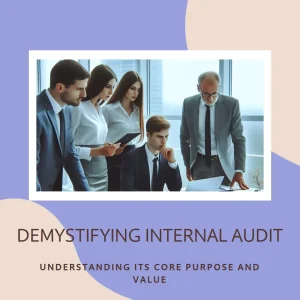Introduction
The Certified Public Accountant (CPA) designation is a prestigious credential that holds significant importance in the field of internal audit. For professionals in this domain, obtaining a CPA not only enhances their credibility but also equips them with the necessary skills and knowledge to navigate the complexities of financial reporting, compliance, and risk management. As internal auditors serve as the eyes and ears of senior leadership and the board of directors, having a CPA can bolster their ability to provide valuable insights and recommendations that drive organizational improvement and safeguard against risks [8].
The CPA process involves several key components, including education requirements, passing the CPA exam, and gaining relevant work experience. Typically, candidates must complete a minimum of 150 semester hours of college coursework, which often includes a bachelor’s degree in accounting or a related field. Following this, they must successfully pass the four sections of the CPA exam, which tests their knowledge in areas such as auditing, financial accounting, regulation, and business concepts. Additionally, candidates are required to accumulate a certain amount of professional experience under the supervision of a licensed CPA, which can vary by state [3][11].
In this blog post, we aim to gather insights from seasoned internal auditors who have navigated the CPA journey themselves. By sharing their experiences, challenges, and strategies, we hope to provide valuable perspectives that can guide aspiring internal auditors and students in understanding the time commitment and dedication required to achieve this esteemed designation. These insights will not only illuminate the CPA process but also highlight its relevance in enhancing the effectiveness and credibility of internal audit professionals in today’s dynamic business environment.
Understanding the CPA Process
The journey to becoming a Certified Public Accountant (CPA) is a significant commitment that involves several key steps. For internal audit professionals and students, understanding this process is crucial for planning their careers effectively. Here’s a comprehensive overview of the CPA journey, including the main steps involved, different pathways, and the significance of each step in the context of internal auditing.
Main Steps Involved in Becoming a CPA
- Education:
- Most states require candidates to complete a minimum of 150 credit hours of college education, which typically includes a bachelor’s degree in accounting or a related field. This educational foundation is essential as it equips candidates with the necessary knowledge of accounting principles, auditing standards, and ethical practices, which are critical in internal auditing [1].
- Examination:
- The CPA Exam consists of four sections: Auditing and Attestation (AUD), Financial Accounting and Reporting (FAR), Regulation (REG), and Business Environment and Concepts (BEC). Each section tests different competencies, with AUD focusing on auditing practices, which is particularly relevant for internal auditors. Candidates must pass all four sections within an 18-month period, which requires strategic study and preparation [1][8].
- Experience:
- Candidates must also fulfill specific work experience requirements, which typically involve one to two years of relevant experience under the supervision of a licensed CPA. This practical experience is invaluable as it allows candidates to apply their theoretical knowledge in real-world scenarios, enhancing their skills in internal auditing and compliance [1][12].
Most states require candidates to complete a minimum of 150 credit hours of college education, which typically includes a bachelor’s degree in accounting or a related field. This educational foundation is essential as it equips candidates with the necessary knowledge of accounting principles, auditing standards, and ethical practices, which are critical in internal auditing [1].
Different Pathways to CPA Certification
- 150 Credit Hours:
- Many states mandate that candidates complete 150 credit hours of education, which can be achieved through a combination of undergraduate and graduate coursework. This requirement ensures that candidates have a comprehensive understanding of accounting and auditing practices, which is essential for effective internal auditing [1].
- Work Experience Requirements:
- The experience requirement varies by state but generally includes working in a public accounting firm or a corporate accounting department. This experience is crucial for developing practical skills in auditing, risk assessment, and compliance, all of which are vital for a successful career in internal auditing [1][12].
Significance of Each Step in Internal Auditing
- Educational Foundation:
- A solid educational background in accounting and auditing principles is fundamental for internal auditors. It prepares them to understand complex financial statements, regulatory requirements, and internal controls, which are essential for conducting effective audits [1].
- Examination Rigor:
- The CPA Exam is designed to test a candidate’s knowledge and application of accounting and auditing standards. For internal auditors, passing this exam demonstrates a commitment to professional excellence and a deep understanding of auditing practices, which enhances their credibility and effectiveness in their roles [1][8].
- Practical Experience:
- Gaining hands-on experience in auditing allows candidates to develop critical thinking and analytical skills. This experience is particularly important in internal auditing, where professionals must assess risks, evaluate controls, and provide insights to improve organizational processes [1][12].
Timeframe for Each Stage of the CPA Process
The journey to becoming a Certified Public Accountant (CPA) is a significant commitment, particularly for professionals in internal audit. Understanding the time required for each stage can help aspiring CPAs plan effectively. Here’s a breakdown of the estimated time commitments involved in the CPA process:
1. Educational Prerequisites
To qualify for the CPA exam, candidates typically need to complete a bachelor’s degree in accounting or a related field, which usually takes about 4 years. However, most states require candidates to have 150 credit hours of education, which often necessitates additional coursework beyond a standard bachelor’s degree. This can add an extra 1 to 2 years to the educational timeline, depending on whether candidates pursue a master’s degree or additional undergraduate courses [3][12].
2. CPA Exam Preparation and Passing
Once educational requirements are met, candidates must prepare for the CPA exam. The preparation time can vary widely, but on average, candidates spend 6 to 12 months studying for the exam. The CPA exam consists of four sections, and candidates often take them one at a time, which can extend the overall timeline. The average pass rate for the CPA exam is around 50%, indicating that many candidates may need to retake sections, further extending the time commitment [2][5][9].
3. Experience Requirements
In addition to passing the CPA exam, candidates must fulfill experience requirements, which typically involve 1 to 2 years of supervised work experience in accounting or a related field. This experience is crucial as it not only helps candidates apply their knowledge but also meets the licensure requirements set by state boards [3][12]. The duration can vary based on the individual’s job situation and the specific requirements of their state.
Perspectives from Industry Leaders
The journey to becoming a Certified Public Accountant (CPA) is a significant milestone for many internal auditors. Insights from seasoned professionals reveal a range of experiences, challenges, and strategies that can guide aspiring CPAs in their pursuit. Here are some key points drawn from their personal anecdotes and reflections.
Personal Experiences and Insights
- Time Commitment: Many internal auditors emphasize that the CPA process typically requires a substantial time investment. One auditor noted, “Balancing work and study was challenging. I dedicated evenings and weekends to prepare for the exams, which took about 6-12 months depending on my schedule” [5]. This highlights the importance of planning and time management in the CPA journey.
- Diverse Backgrounds: The experiences of internal auditors vary significantly based on their educational and professional backgrounds. For instance, an auditor with a strong accounting foundation shared, “I found the transition to CPA relatively smooth, as my undergraduate studies prepared me well. However, colleagues from non-accounting backgrounds faced a steeper learning curve” [10]. This indicates that prior knowledge can influence the duration and difficulty of the CPA process.
- Common Challenges: Many professionals face similar hurdles during their CPA journey. A recurring theme is the difficulty in mastering the vast amount of material. One internal auditor remarked, “The sheer volume of information was overwhelming at times. I overcame this by breaking down the study material into manageable sections and setting specific goals for each week” [12]. This approach not only aids in retention but also helps maintain motivation.
Overcoming Challenges
- Support Systems: Establishing a support network is crucial. An auditor shared, “Joining a study group made a significant difference. We held each other accountable and shared resources, which made the process less isolating” [14]. This underscores the value of collaboration and community in navigating the CPA process.
- Utilizing Resources: Many seasoned auditors recommend leveraging various study resources, including online courses, textbooks, and practice exams. One professional stated, “I found that using a mix of resources tailored to my learning style helped me grasp complex topics more effectively” [15]. This adaptability can enhance understanding and retention of the material.
- Mindset and Resilience: The journey to CPA is not just about technical knowledge; it also requires mental fortitude. An experienced auditor advised, “Stay positive and resilient. There will be setbacks, but each failure is a learning opportunity. Keep pushing forward” [11]. This mindset can be pivotal in overcoming obstacles and achieving success.
Tips for Managing Time During the CPA Journey
Embarking on the journey to become a Certified Public Accountant (CPA) can be particularly challenging for internal audit professionals who must balance their demanding work schedules with rigorous exam preparation. Here are some practical strategies and insights from seasoned internal auditors to help optimize your time effectively.
1. Balancing Work, Study, and Personal Commitments
- Prioritize Tasks: Identify which sections of the CPA exam you find most challenging or time-consuming. Focus on these areas first to allocate your study time effectively [3][4].
- Break Down Study Sessions: Implement techniques such as the Pomodoro Technique, where you study in focused bursts (e.g., 52 minutes of study followed by a short break). This method can enhance concentration and retention [1].
- Set Clear Goals: Establish specific, measurable goals for each study session. This clarity will help you stay on track and make the most of your limited time [11].
2. Time Management Tools and Study Resources
- Utilize Digital Tools: Consider using time management apps like Trello or Asana to organize your study schedule and track your progress. These tools can help you visualize your tasks and deadlines [12].
- Study Resources: Leverage CPA review courses that offer tailored content for internal audit professionals. Resources that focus on practical applications of accounting principles can be particularly beneficial [7].
- Create a Study Calendar: Develop a calendar that outlines your study plan, including deadlines for each CPA exam section. This will help you allocate time effectively and avoid last-minute cramming [12].
3. Networking and Finding Study Partners
- Engage with the Internal Audit Community: Networking with fellow internal auditors can provide valuable support and insights. Join professional organizations or online forums where you can share experiences and study tips [15].
- Form Study Groups: Collaborate with colleagues or peers who are also preparing for the CPA exam. Study groups can enhance motivation and accountability, making the preparation process more enjoyable and effective [12].
- Seek Mentorship: Connect with seasoned CPAs in your network who can offer guidance and share their own experiences. Their insights can help you navigate challenges and stay focused on your goals [9].
By implementing these strategies, internal audit professionals can effectively manage their time during the CPA journey, ensuring a balanced approach to work, study, and personal life. With the right planning and support, achieving CPA certification can become a more manageable and rewarding endeavor.
The Importance of CPA for Internal Auditors
Obtaining a Certified Public Accountant (CPA) designation is a significant milestone for professionals in the internal audit field. This credential not only enhances an auditor’s skill set but also opens doors to numerous career advancement opportunities. Here are some key points that highlight the value of a CPA in internal auditing:
- Career Advancement Opportunities:
- The CPA designation is often viewed as a gold standard in the accounting and auditing professions. Internal auditors with a CPA credential are frequently considered for higher-level positions, such as audit manager or director, due to their advanced knowledge and expertise in financial reporting and compliance. This can lead to increased responsibilities and higher salaries, as organizations seek professionals who can navigate complex financial landscapes effectively [12].
- Credibility and Professionalism:
- CPAs are held to high ethical standards and are required to maintain their knowledge through continuing education. This commitment to professionalism enhances the credibility of internal auditors within their organizations. Having a CPA designation signals to stakeholders that the auditor possesses a thorough understanding of accounting principles, regulatory requirements, and risk management practices, which is crucial for effective internal auditing [10][13].
- Impact on Career Growth:
- Studies have shown that professionals with a CPA designation tend to experience faster career progression compared to their non-CPA counterparts. For instance, a survey indicated that CPAs are more likely to be promoted within their organizations and often command higher salaries. Entry-level internal auditors with a CPA can expect to earn around $45,000, while those in executive positions can exceed $86,000 annually, reflecting the financial benefits of obtaining this credential [12].
Conclusion
Embarking on the CPA journey is a significant commitment that requires careful planning and dedication. The time it takes to complete the CPA process can vary widely based on individual circumstances, including prior education, work experience, and personal study habits. Generally, candidates can expect to invest several months to a few years in preparation, depending on how they balance their studies with professional responsibilities.
Key takeaways from industry leaders emphasize the importance of understanding this time commitment and being realistic about the demands of the CPA process. Many seasoned internal auditors recommend creating a structured study plan and setting achievable milestones to stay on track.
Moreover, seeking out mentors and utilizing available resources can greatly enhance the CPA experience. Engaging with experienced professionals can provide invaluable insights, guidance, and encouragement throughout the journey.
Find out more about Shaun Stoltz https://www.shaunstoltz.com/about/
This post was written by an AI and reviewed/edited by a human.



